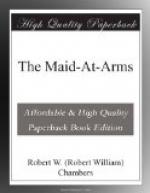“Mr. Ormond! Mr. Ormond!” broke in Colonel Claus. “Do you impeach Lord George Germaine?”
“I care not whom I impeach!” I said, hotly. “If Lord George Germaine counsels the employment of Indians against Englishmen, rebels though they be, he is a monstrous villain and a fool!”
“Fool!” shouted Colonel Campbell, choking with rage. “He’d be a fool to let these rebels win over the Iroquois before we did!”
“What rebel has sought to employ the Indians?” I asked. “If any in authority have dreamed of such a horror, they are guilty as though already judged and damned!”
“Mr. Ormond,” cut in Guy Johnson, fairly trembling with fury, “you deal very freely in damnation. Do you perhaps assume the divine right which you deny your King?”
“And do you find merit in crass treason, sir?” burst out McDonald, striking the table with clinched fist.
“Treason,” cut in Sir John Johnson, “was the undoing of a certain noble duke in Queen Anne’s time.”
“You are in error,” I said, calmly.
“Was James, Duke of Ormond, not impeached by Mr. Stanhope in open Parliament?” shouted Captain McDonald.
“The House of Commons,” I replied, calmly, “dishonored itself and its traditions by bringing a bill of attainder against the Duke of Ormond. That could not make him a traitor.”
“He was not a traitor,” broke out Walter Butler, white to the lips, “but you are!”
“A lie,” I said.
With the awful hue of death stamped on his face, Walter Butler rose and faced me; and though they dragged us to our seats, shouting and exclaiming in the uproar made by falling chairs and the rush of feet, he still kept his eyes on me, shallow, yellow, depthless, terrible eyes.
“A nice scene to pass in women’s presence!” roared the patroon. “Dammy, Captain Butler, the fault lies first with you! Withdraw that word ‘traitor,’ which touches us all!”
“He has so named himself,” said Walter Butler, “Withdraw it! You foul your own nest, sir!”
A moment passed. “I withdraw it,” motioned Butler, with parched lips.
“Then I withdraw the lie,” I said, watching him.
“That is well,” roared the patroon. “That is as it should be. Shall kinsmen quarrel at such a time? Offer your hand, Captain Butler. Offer yours, George.”
“No,” I said, and gazed mildly at the patroon.
Sir George Covert rose and sauntered over to my chair. Under cover of the hubbub, not yet subsided, he said: “I fancy you will shortly require a discreet friend.”
“Not at all, sir,” I replied, aloud. “If the war spares Mr. Butler and myself, then I shall call on you. I’ve another quarrel first.” All turned to look at me, and I added, “A quarrel touching the liberties of Englishmen.” Sir John Johnson sneered, and it was hard to swallow, being the sword-master that I am.
But the patroon broke out furiously. “Mr. Ormond honors himself. If any here so much as looks the word ‘coward,’ he will answer to me—old and fat as I am! I’ve no previous engagement; I care not who prevails, King or Congress. I care nothing so they leave me my own! I’m free to resent a word, a look, a breath—ay, the flutter of a lid, Sir John!”




